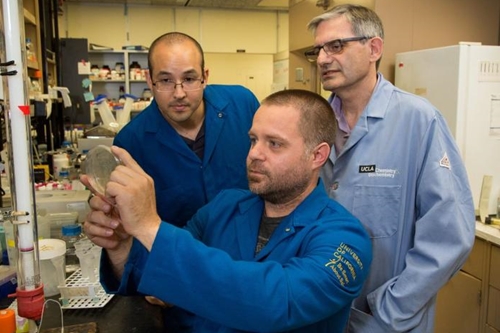
Synthetic biochemistry team, L-R, Paul Opgenorth, Tyler Korman, and James Bowie (reed Hutchinson, Univ of California, Los Angeles)
13 April 2016. A biochemistry lab at University of California in Los Angeles developed techniques for producing synthetic bio-based chemicals without processing sugars through cells. The discoveries from the lab of biochemistry professor James Bowie is described in the 11 April 2016 issue of the journal Nature Chemical Biology (paid subscription required).
Bowie, with postdoctoral researchers Paul Opgenorth and Tyler Korman, sought a more straightforward and predictable method for producing biochemical compounds that bypasses cells to generate the needed chemical reactions. Earlier attempts to design synthetic cells for processing sugars into biofuels or pharmaceuticals were found to be extremely difficult. “The cell fights us the whole way,” says Bowie in a UCLA statement. “It will take the sugar and do other things with it that you don’t want, like build cell walls, proteins, and RNA molecules.”
The UCLA team devised their techniques with combinations of enzymes to produce the chemical reactions needed to process glucose similar to cellular processes. Their methods build biochemical pathways with complex enzyme combinations in lab flasks, instead of in cells of an organism. Once the desired combinations of enzymes are found and the chemical pathway established, yields can approach 100 percent, say the researchers since glucose inputs aren’t diverted by cells.
The researchers report finding the right enzyme combinations, however, was anything but straightforward. Because some of the chemical processes needed are not found in nature, they had to create their own. “If the enzymes are not good enough — not fast enough, not stable enough — then we re-engineer them,” says Korman.
In addition, cells provide regulatory functions that Bowie and colleagues had to recreate in the lab. One of those functions is control of high-energy molecules to maintain a balance of metabolic factors. The researchers earlier developed and reported on a molecular purge valve to maintain this balance.
In a proof-of-concept study, the researchers produced bio-based plastics, using their synthetic biochemical processes to generate yields of 90 percent in the lab. Bowie’s lab already reported on production of polyhydroxybutyryl, a biodegradable polymer plastic previously made with microorganisms to process glucose feedstocks.
The team believes their synthetic biochemical process can be adapted to produce biofuels as well. Bowie is a member of the UCLA-DOE Institute that applies synthetic biology processes to energy production, and U.S. Department of Energy is funding the team’s research.
Korman and Opgenorth are also exploring the commercial potential of their discoveries through their newly formed start-up company Invizyne Technologies Inc. in Culver City, California. Bowie is a scientific adviser to the company.
Read more:
- On-Demand Pharma Manufacturing System Developed
- Process Devised for Plastics from Carbon Dioxide, Plants
- Bacterial Bonding Technique Devised to Simplify Vaccines
- €50,000 Challenge Seeks New Gas Technologies
- Technique Developed to Extend Peptide Lifetimes
* * *

 RSS - Posts
RSS - Posts
You must be logged in to post a comment.